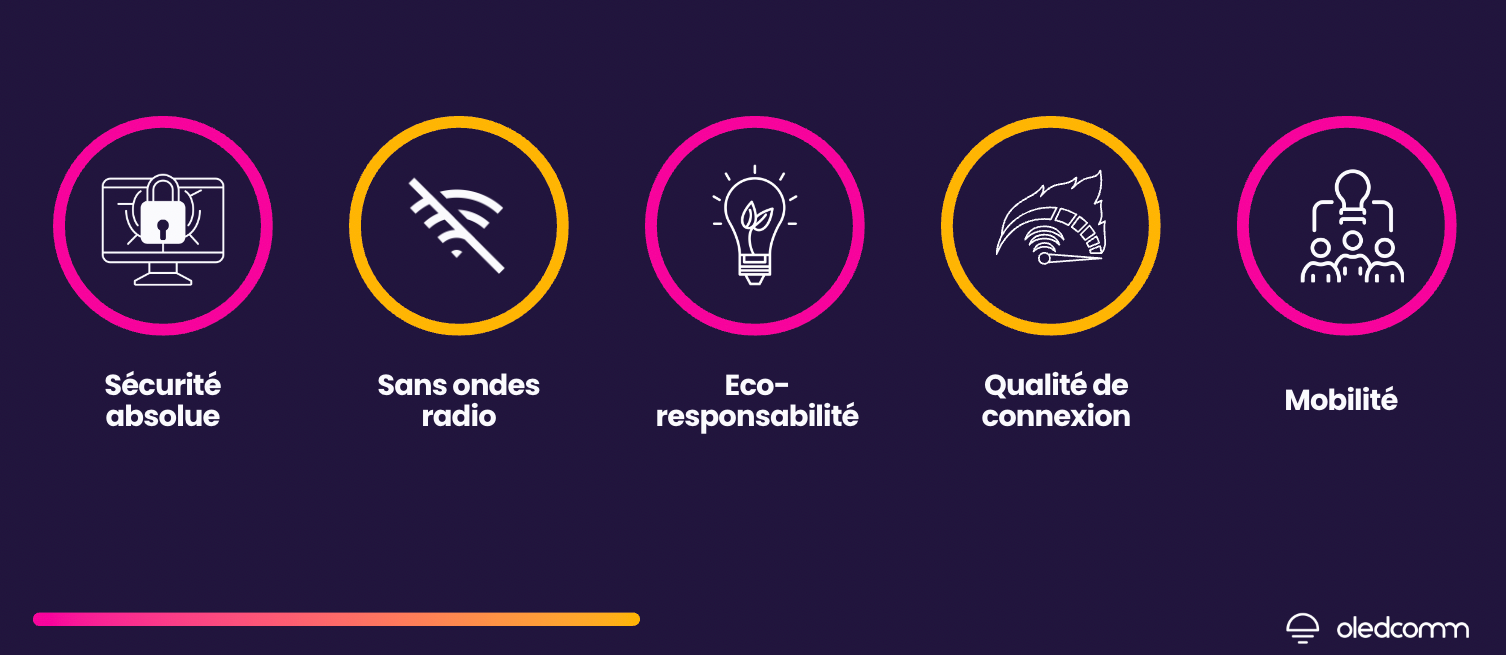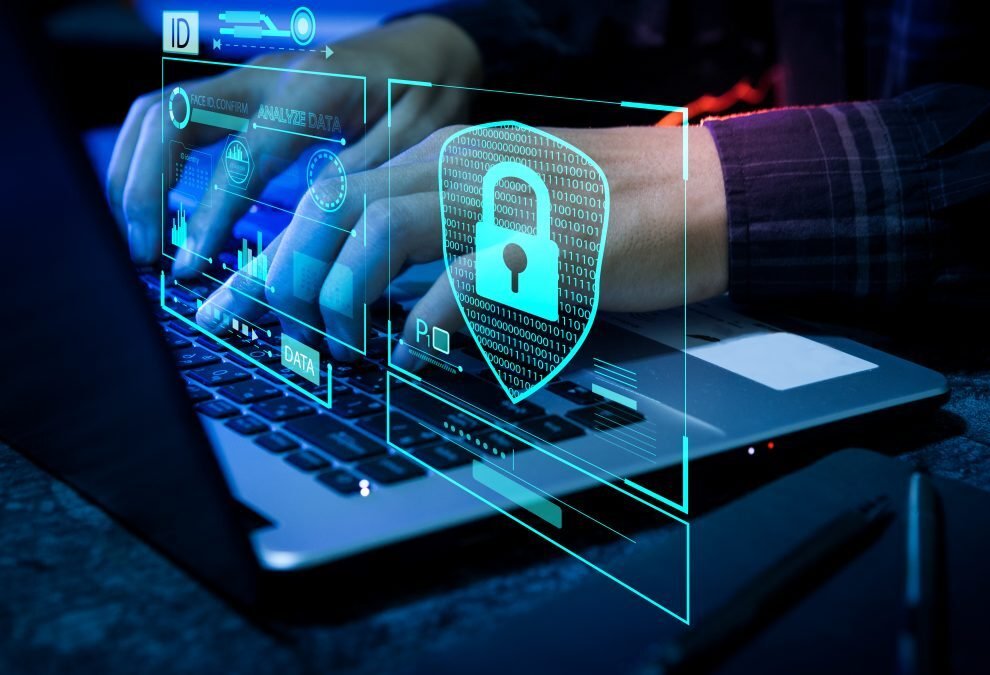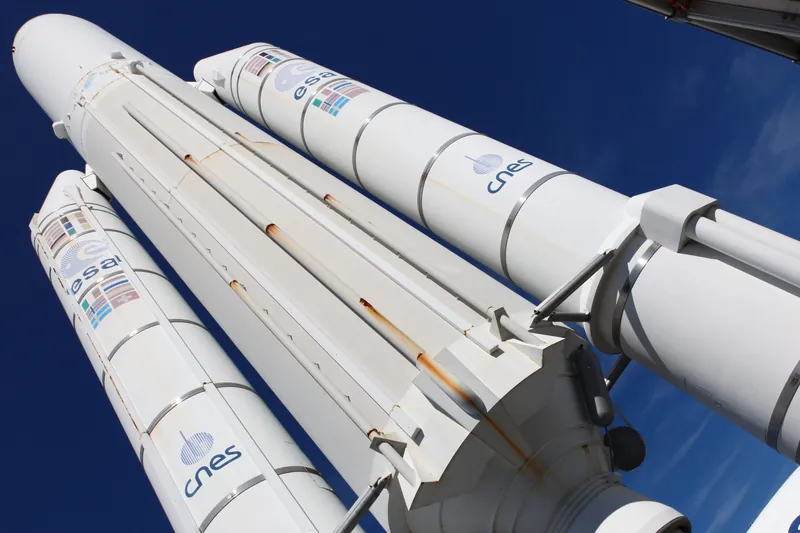
Blog
6 benefits of LiFi
Safer, healthier, more efficient and lighter than traditional technologies, LiFi is on its way to revolutionize the concept of connectivity in many areas.

6 benefits of LiFi, the light-based communication technology
After years of research & development, LiFi has started an expansion that nothing can stop. Behind this four-letter word from the contraction of "Light Fidelity" is one of the most promising technological innovations of recent decades: wireless communication by light. This transmission takes place between a transmitter (Access Point) and a receiver (Dongle) connected to an electronic device (computer, smartphone, tablet, etc.)
Safer, healthier, more efficient and lighter than traditional technologies, LiFi is on its way to revolutionize the concept of connectivity in many areas. Between data security, absence of radio waves, reduction of carbon footprint and connection speed, we have listed for you 6 of the main advantages of LiFi.
1. an unstoppable signal
In an ultra-connected world where the most sensitive information is digitized and exchanged via WiFi, cybercrime is living its golden age. Indeed, a single WiFi access point has an average range of 250 meters outdoors and 35 meters indoors, which makes this technology the preferred terrain of hackers who manage to pirate the signal from outside structures.
LiFi provides a simple and uncompromising answer to this increasingly central issue in our society. Data transmission via LiFi only takes place in the light beam projected from the ceiling (or desk lamp) to the workstation(s) and does not pass through the walls of the room in which the signal is transmitted.
In other words, any room equipped with a LiFi system is completely impervious from the outside, and it is even possible to adjust the coverage angle of the access point so that it only feeds a particular area of the room. This is a real revolution for the defense sector, government institutions, research and medical fields.
2. fast connectivity
Of course, this major advance in cybersecurity does not come at the expense of the quality of the connection. Still in the early stages of development, LiFi already achieves a speed equivalent to that of fiber optics, i.e. a speed of 1 Gb/s. In practice, this means that LiFi users can fully enjoy the resources of the Internet: streaming, video games, video conferencing...
3. LiFi, a non-harmful technology
Since the implementation of the law n° 2015-136 of February 9, 2015 called "Abeille" law, related to sobriety, transparency, information and consultation in terms of public exposure to electromagnetic waves, establishments offering public WiFi access (town hall, establishments offering WiFi access to the public (town halls, media libraries) must clearly indicate this by means of a pictogram at the entrance to the establishment, establishments that welcome children under 3 years of age are forbidden to use WiFi in areas reserved for reception, rest and activities, and WiFi must be switched off in elementary school when it is not being used for an educational activity.
Because it relies solely on the light intensity variations of an LED bulb, LiFi, unlike WiFi, is completely free of electromagnetic waves called radio frequencies. While WiFi uses the radio waves of the electromagnetic spectrum, LiFi uses its visible part, also called optical spectrum.
At a time when the impact of radio waves on health, especially for the most vulnerable, is a matter of concern, the democratization of a healthy and efficient alternative to WiFi wherever radio frequencies are not desirable is imperative.
This characteristic makes LiFi a preferred wireless communication solution for schools, hospitals, retirement homes or any other establishment hosting a vulnerable public.
4. a stable and consistent connection
While latency increases with the number of users connected on traditional technologies, LiFi is able to provide consistent connectivity to each user with a latency of as little as 0.5 milliseconds, even in a room with more than 30 people. In both business and education environments, this unprecedented connection stability opens the door to new educational possibilities: collaborative platforms, video meetings, online exams, MOOCs, interactive games...
5. no interference between LiFi and WiFi / 4G / 5G
The light waves on which LiFi operates do not interfere with the waves emitted by other wireless communication technologies (WiFi, 4G, 5G networks) that are often present in the vicinity of LiFi's use. This lack of interference makes LiFi particularly suitable for use in the aviation industry, as it does not interfere with the operation of onboard equipment.
6. light and unobtrusive installation
The lightness of a LiFi installation is far from being a detail, especially in the air transport sector. While an airplane's WiFi equipment weighs about 1.3 tons because of the shielded leather cables used to prevent interference, LiFi can cut that weight in half, with equivalent or even better performance. The result is a significant reduction in CO2 emissions as well as fuel and maintenance costs.
The same is true for computer rooms in schools, which can now do without the inconvenient and dangerous clusters of cables.
Switching to LiFi doesn't require a complete infrastructure redesign and endless construction. LiFi has few hardware and regulatory constraints and can be integrated into existing lighting systems to create an unobtrusive and functional result.
But the benefits of LiFi don't stop there. Because this technology can be modulated and shaped to serve all types of structures, it potentially has as many benefits as it has users.
Recent articles

Categories
See some more...



